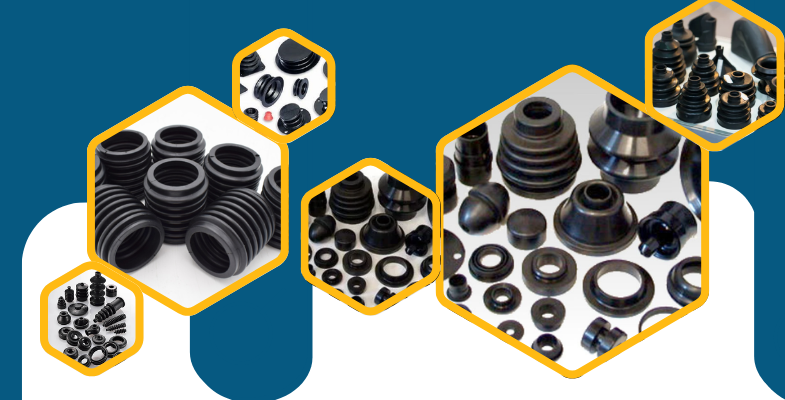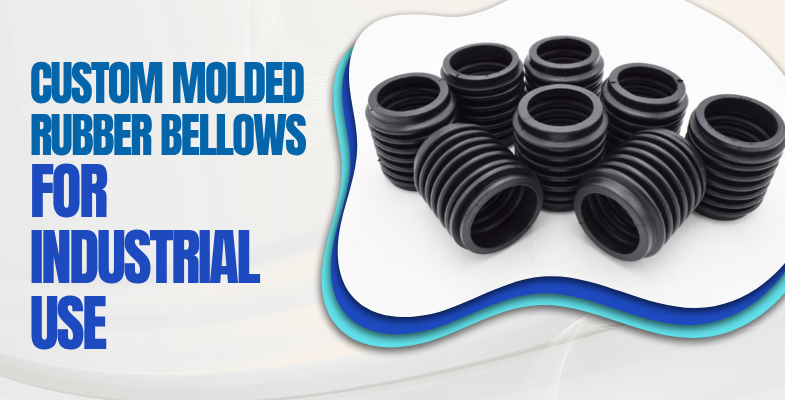Bellows play a crucial role in protecting parts, tools, and moving machine joints. It prevents dust, oil, and heat from entering but still permits full movement. Such components bend with movement but never rip, crack, or wear out prematurely.
It maintains machines free of dirt and operating even in harsh work areas every day. A trusted Custom molded rubber bellows part will hold up under stress and heat. It has to be the same size and shape so the fit is always tight. Proper design guarantees smooth flexing, clean sealing, and no leak points in the long run.
Durable bellows resist shock, hold air in, and exclude dust from within components. A rubber bellow manufacturer makes each unit to match the worksite, use, or gear. It should last long, stay soft, and move right without shape loss.
Bellows support the whole machine by sealing its weakest gaps. The better the bellows, the longer the tools stay safe and sound.
Why Are Custom Molded Bellows Used in Industry?
Gears in most factories must move but remain sealed from damage. It is subject to dust, water, oil, heat, or even cutting fumes. This is where custom molded rubber bellows show their worth. They compress and expand, but remain robust under pressure and with time. The bellows permit movement but hold the system firm and closed.
It helps the machinery last longer without abrupt breakdowns or wear problems. Pumps and valves require them to perform optimally under demanding everyday operations. Joints and tools are assisted by bellows under difficult areas and unusual angles. The components keep things flowing without a crack or a leak ever occurring.
Each piece is designed to match the gaps that standard seals can’t fill in well. Since there will never be two setups the same, the fit has to be precise. These bellows pay off over the life cycle by eliminating waste and damage.
A trusted rubber custom bellows manufacturer ensures it holds up in any job. Companies select size, form, and compound according to heat or load requirements. Installed, it remains firm and resists time, heat, and shock.
These components are not refined, but they are the foundation of uptime. The bellows protect what’s within and brace what’s on the outside with silent strength.
How Are Molded Rubber Bellows Made?
The procedure starts with the designing of molds in steel or hard aluminium blocks. The molds form rubber into precise shapes for folds, cones, or ribs. Each cavity is designed to correspond to the use of the part, the load, or the space.
It requires time and expertise to achieve the correct mix. When full, the mold seals and maintains the shape under pressure. This prevents any air pockets or gaps from being left within the material. A rubber bellow manufacturer tests each unit for size and surface finish before use.

It is normal to use a split or single mold for easier access. Split molds can accommodate parts with tight design angles or deep ribs. This versatility is useful in creating shapes that regular seals cannot accommodate.
It retains its shape through clever design, such as ribs and lengthy folds. The rib provides strength while enabling a clean bend without rip. Such components routinely go into equipment, HVAC systems, or car systems.
A trusted team makes customised rubber bellows fit very exactly to the user’s needs. It may appear uncomplicated, but the process that goes into it is intricate. The bellows need to move without wearing out and withstand actual stress.
What Rubber Types Work Best for Bellows?
All rubber types contribute a distinct advantage to bellow performance and applications. Nitrile is optimal for situations where frequent oil, grease, or fuel contact is anticipated. It performs well with these fluids but remains flexible when under pressure and motion. EPDM is ideal for high-heat applications where other rubbers would melt or crack quickly.
It is resistant to steam, UV, and even some aggressive chemical splashes. Silicone has a place in lab or food applications where cleanliness matters most. It remains flexible in cold and remains stable in heat, which makes it extremely safe. Each of these plays a key part in molded rubber bellows design.
It’s important to verify where and how the bellows will be used daily. Neoprene works great in salt, sun, or ozone-rich environments long-term. It will not fade, become hard, or lose shape from exposure to light or air. This makes it perfect for outdoor applications or marine-intensive gear systems.
A custom bellows manufacturer will guide choices based on actual work needs. Some blends are more flexible, and others are more resistant to wear or chemical attack. Bellows need to be matched to the task, or they may fail prematurely or fit poorly. Rubber selection is the difference when lives and money are involved.
What Makes a Bellow High-Quality?
It requires more than form to deem a bellow high in quality. Wall thickness should remain stiff enough to retain form but still bend. Too thin, and it rips apart; too heavy, and it will not curve properly. It should have evenly spaced ribs along its body with no weak areas. A top custom molded rubber bellows unit shows no bubbles or surface marks. These flaws weaken the part and lead to stress cracks under use.
It needs to pass flex tests, heat tests, and even extended leak tests. Every test guarantees that it bends, seals, and retains without damage or shift. These tests verify how successfully the material and mold process functioned. It’s also important that the bellow maintains its shape in the long term.
A trusted rubber custom bellows company ensures each piece meets those strict rules. This keeps machines operational and prevents expensive downtime or unexpected part failure. A quality bellow is dense, smooth, and holds pressure with no problem.
Conclusion
The bellow needs to seal tightly and shut out foreign attack well. It shields tools, seals air, and withstands heat or stress. The poor bellows rupture quickly and cause premature part failure or leakage. Proper design equals long life, smooth action, and clean sealing in all cases.
Molded rubber bellows offer strength and fit. These are shaped with care to match each part or tight space fully. Smooth flexibility is maintained, and ends remain strong even after harsh and prolonged use cycles. The reliable design and tight control make a small part a solid guard. A good seal retains firmness even under heat, cold, or severe shock loads.
Any job that bends or seals gains from customised rubber bellows done right. It’s about tough walls, slippery ribs, and a flawless shape every time.
